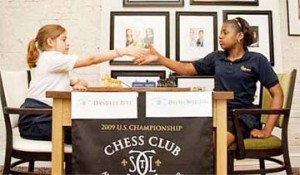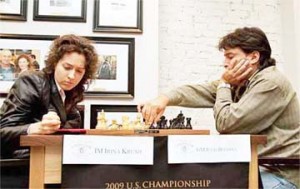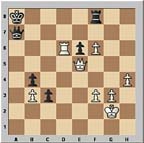All other things being equal, confidence wins games. Allied to the will to win, it sparks the mental ignition, brings forth ideas, dispels doubts, and promotes clear thinking.
-Al Horowitz, grandmaster and New York Times columnist

There was a time when chess was regarded as a dull old man’s game. Because they could not understand the game, it was normal to dismiss its very existence. But throughout the centuries, chess was never insignificant. It was played by kings and queens, emperors, and noblemen, and generals, and admirals.
Then a few centuries ago, chess came to the people. Today, it is a young man’s game, and has become a very important feature in the lives of millions worldwide. Today there are professional chess players, just like professional footballers, or cricketers, or tennis players. Elite chess players are paid appearance fees to participate in a tournament. Times have changed. Businesses have been compelled to treat the game with respect financially.
People have come to realize that chess-playing at a high level requires a certain type of mind, though exactly what kind psychologists have not as yet determined. For chess is an accretion of knowledge, and every new move made by an elite grandmaster, goes into the general fund. Out of an infinite number of possibilities, certain responses have been proved to be more accurate than others. The pure intellectual and physical effort of staring at a chessboard without being allowed to touch it, trying to capture all possibilities and anticipate all future situations, is brainwork on a rarefied level, and there is a heavy drain on the body.
Bobby Fischer was the first chess player to come out openly and tell the world that chess was just as, or even more demanding, than some of the physical disciplines which attracted high purses. He insisted on being paid for his efforts, and he was. Before the Spassky match Fischer let it be known that he would not play for the world championship title unless the purse was at least US$50,000. This was 1972. There was tolerant laughter. Everybody thought that Fischer was out of his mind. Fifty thousand dollars for a chess match? Who on earth would be willing to put up that sum? But when it was all over Fischer walked away with the winner’s share of a purse of US$250,000. It was, at the time – prizefight purses excepted – the largest single purse for a sporting event ever recorded. Boris Spassky, when he had won the world championship three years previously, got US$1400 as his prize money. Chess had entered the age of opulence.
Fischer pointed out that to become a chess champion you had to train like an athlete. He believed that he had to be in superb physical shape in order to play his best. Your chess deteriorates as your body does. You cannot separate body from mind. When he played for the championship, Fischer would sleep during the day in preparation for his 7 pm game. In the afternoon he would start with a few games of tennis, followed by a strenuous workout in the gym, consisting of anything from weightlifting to calisthenics to fiercely jabbing a punching bag. He would bowl occasionally, go for some laps in the pool, play ping-pong and have daily steam baths. Long walks were also a part of his regimen, where he had the opportunity of thinking things through while alone.

The peak years for a chess player are from twenty to thirty. Nowadays we have grandmasters in their early teens. Older people find it increasingly hard to memorize, conceptualize and assimilate. They find themselves prey to hungry kids up on the latest theory. There is also the matter of body conditioning, as Fischer said. It takes a healthy, youthful body to stand up to the rigours or match or tournament play – usually five-hour uninterrupted sessions of concentrated brain-boiling. It’s not easy.
Chess players therefore, and similarly chess organizations, should command the identical respect which is given to other sports. If businesses use other disciplines for their advertisements, chess should also be considered. If businesses support the other disciplines tangibly, chess should also be considered. It is a young person’s game, and therefore sponsors would benefit from its development.
Krush v Becerra
Grandmaster Hikaru Nakamura played the tournament of his life to win the 2009 US Chess Championship. He scored a sensational seven points from nine games and did not concede victory to any of his opponents, who included world championship candidate Gata Kamsky. The lone female player in the competition, International Master Irina Krush, beat Grandmaster Julio Becerra from Florida in an exciting encounter. Here is the game.
 Krush, I (2452) – Becerra Rivero, J (2609)
Krush, I (2452) – Becerra Rivero, J (2609)
CH—USA Saint Louis USA (6), 13.05.2009
1.d4 d5 2.c4 c6 3.Nf3 Nf6 4.Nc3 e6 5.Bg5 dxc4 6.e4 b5 7.e5 h6 8.Bh4 g5 9.Nxg5 hxg5 10.Bxg5 Nbd7 11.exf6 Bb7 12.g3 c5 13.d5 Qb6 14.Bg2 b4 15.Na4 Qa6 16.0-0 0-0-0 17.a3 Bxd5 18.Bxd5 Ne5 19.axb4 Rxd5 20.Qe2 cxb4 21.Nc3 Ra5 22.Rxa5 Qxa5 23.Ne4 Nd3 24.Be3 Qh5 25.f3 Qe5 26.Qc2 Qb5 27.b3 c3 28.Bxa7 Rh5 29.Be3 Qa6 30.Bg5 Ne5 31.h4 Rh8 32.Kg2 Bh6 33.Bxh6 Rxh6 34.Rd1 Rh8 35.Nd6+ Kb8 36.Qe4 Nc6 37.Nxf7 Rf8 38.Ne5 Nxe5 39.Qxe5+ Ka8 40.Rd6 Qa7
and Black resigned, seeing there is no defence against the impending checkmate… 1-0.









